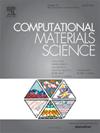Scaling law-informed machine learning for predicting thermal and electrical properties of polymers: A physics-based approach
IF 3.1
3区 材料科学
Q2 MATERIALS SCIENCE, MULTIDISCIPLINARY
引用次数: 0
Abstract
Polymer materials hold great promise for a wide range of applications due to their unique structures and properties. Using machine learning to predict their properties is a highly promising approach. However, the limited number of polymer databases hinders the application of machine learning methods. In this work, we choose to introduce physical prior knowledge at the output layer of the model by fitting the scaling law relationships satisfied by polymer to predict their properties. This approach of introducing physical prior knowledge at the output layer does not conflict with other methods of incorporating prior knowledge, such as molecular encoding and model pre-training, indicating its good portability and potential for application in more polymer property prediction models. We design the model structure from a perspective that aligns with physicochemical intuition. We first validate the model’s effectiveness and portability on a small dataset containing 1,070 data points and finally use this method to successfully predict the electrical conductivity of polymer electrolyte materials with an R2 value of approximately 0.8. This modeling approach is expected to open up new avenues for polymer property prediction.

基于比例定律的机器学习预测聚合物的热电性质:一种基于物理的方法
高分子材料由于其独特的结构和性能,具有广泛的应用前景。使用机器学习来预测它们的属性是一种非常有前途的方法。然而,有限数量的聚合物数据库阻碍了机器学习方法的应用。在这项工作中,我们选择在模型的输出层引入物理先验知识,通过拟合聚合物满足的标度律关系来预测其性质。这种在输出层引入物理先验知识的方法与其他引入先验知识的方法(如分子编码和模型预训练)不冲突,表明其具有良好的可移植性和应用于更多聚合物性质预测模型的潜力。我们从符合物理化学直觉的角度设计模型结构。我们首先在包含1,070个数据点的小型数据集上验证了模型的有效性和可移植性,最后使用该方法成功预测了聚合物电解质材料的电导率,R2值约为0.8。这种建模方法有望为聚合物性质预测开辟新的途径。
本文章由计算机程序翻译,如有差异,请以英文原文为准。
求助全文
约1分钟内获得全文
求助全文
来源期刊

Computational Materials Science
工程技术-材料科学:综合
CiteScore
6.50
自引率
6.10%
发文量
665
审稿时长
26 days
期刊介绍:
The goal of Computational Materials Science is to report on results that provide new or unique insights into, or significantly expand our understanding of, the properties of materials or phenomena associated with their design, synthesis, processing, characterization, and utilization. To be relevant to the journal, the results should be applied or applicable to specific material systems that are discussed within the submission.
 求助内容:
求助内容: 应助结果提醒方式:
应助结果提醒方式:


